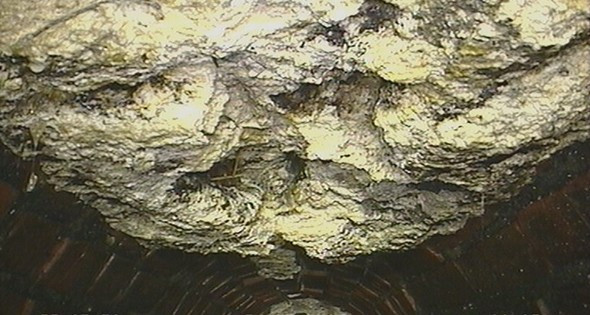London 'Fatberg': Bus-Sized Blob of Fat Removed From City Sewer

A 'fatberg', weighing over 15 tonnes, has been removed from a London sewer following its discovery last week.
Fatbergs develop when food fat is flushed down the sink and mixes with wet wipes to create a lump of waste.
The fatberg found beneath the streets of Kingston was the size of a bus. It was found after locals complained they could not flush their toilets.
Had the fatty tumescence not been removed, it could have led to sewage flooding in homes, streets and businesses. CCTV operators found the fat mound had reduced the sewer to just five percent of its normal capacity.
Gordon Hailwood, waste contracts supervisor for Thames Water said: "While we've removed greater volumes of fat from under central London in the past, we've never seen a single, congealed lump of lard this big clogging our sewers before.
"Given we've got the biggest sewers and this is the biggest fatberg we've encountered, we reckon it has to be the biggest such berg in British history.
"The sewer was almost completely clogged with over 15 tonnes of fat. If we hadn't discovered it in time, raw sewage could have started spurting out of manholes across the whole of Kingston.
Harvesting fatbergs for fuel
"It was so big it damaged the sewer and repairs will take up to six weeks.
"Homes and businesses need to change their ways, when it comes to fat and wipes, please remember: 'Bin it - don't block it'."
Thames Water said it has now begun repairs to the 20 metres of pipe damaged by the fatberg.
Earlier this year, Thames Water said it planned to harvest fatbergs from London's sewers and send them to a power plant to be turned into fuel.
The solidified fat will be used to run the world's biggest fat-fuelled power station in Beckton, east London.
Andrew Mercer, chief executive of green utility company 2OC, which will run the power plant, said: "This is good for us, the environment, Thames Water and its customers. Our renewable power and heat from waste oils and fats is fully sustainable.
"When Thames doesn't need our output, it will be made available to the grid meaning that power will be sourced, generated and used in London by Londoners."
© Copyright IBTimes 2025. All rights reserved.




















